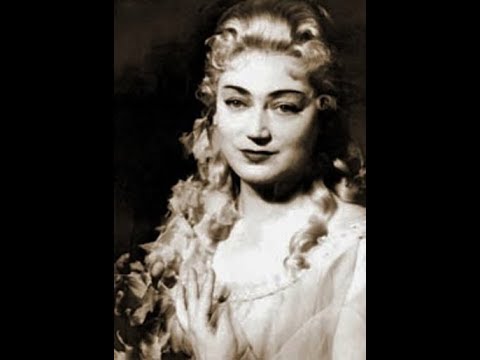|
SATURDEE OPRY LINKS:
All-hits, All-the-Time 2
 
Anne Sofie
von Otter
Milada ubrtová
Saturdee Opry Links Overture!
"La Clemenza di Tito," by Mozart
https://www.youtube.com/watch?v=zWH3G_wbhO0
1.
HELL HATH NO FURY LIKE. . .
SOL continues with our all-hits-all-the-time extravaganza.
Here is the amazing Sumi Jo as Queen of the Night in Mozart's "Magic Flute."
"Die Holle Rache" ("Hell's Revenge.") Coffee not working?
Synopsis: Giving her a knife, the Queen of the Night tells Pamina to kill
Sarastro in order to get the Shield of the Sun from him. You don't want to rile
this Queenie up.
https://www.youtube.com/watch?v=ZAiCbYc4hQ0
Translation:
http://www.aria-database.com/search.php?individualAria=194
2.
Too bad there is no video of this, but that's showbiz. Mario Cavaradossi,
Tosca's lover, a young painter and a political liberal, is to be executed in the
morning. He trades his last possession, a ring, to get a guard to take a letter
to the imprisoned Tosca. As he writes the letter, he sings of his love for Tosca
and for life. The tenor is the astonishing Mario Lanza. "E lucevan le Stelle" ("The stars were
gleaming. . .") from Puccini's "Tosca."
https://www.youtube.com/watch?v=PKoih4dUFHs
Translation:
http://www.aria-database.com/search.php?individualAria=305
Wait! There is video. Live performance at 4:30. Note: the reason the poor guy
keeps shifting his weight and picking up his legs is that both lower legs were
in the throes of extremely painful phlebitis.
https://www.youtube.com/watch?v=ZHpGp_nsuRw
3.
"Rusalka," by Dvorak, was first performed in Prague in 1901, but not premiered
in the U.S. until 1975. In recent years, this gorgeous aria has become a "hit,"
and deservedly, if largely because of its emulation of Puccini (in my opinion.) Here is a a 1975
performance by the Czech soprano, Milada ubrtová. "Pisen Rusalky O Mesiku," or
"Song to the Moon." Ms. Subrtovas assaying the role had much to do with
reviving this opera.
Synopsis: Rusalka, daughter of the Spirit of the Lake, has fallen in love with a
Prince. Unfortunately, Rusalka is a water sprite and cannot come out of the
water or communicate with him. She asks the moon to tell her love that she is
thinking of him.
https://www.youtube.com/watch?v=rvzB_teIpnE
Translation:
http://www.aria-database.com/translations/rusalka01_moon.txt
About Ms. Subrtova:
https://en.wikipedia.org/wiki/Milada_%C5%A0ubrtov%C3%A1
4.
Come on, opera novices, today is for you. All hits, all the time. Here is the
"Rabbit of Seville" aria, "Largo al Factotum," from Rossini's "The Barber of
Seville." Dispatched with aplomb in concert by the great Russian baritone,
Dmitri Hvorostovksy. Here the charmingly insufferable (is that possible?) Figaro
sings of his many talents: doctor, barber, matchmaker, you name it. "Make way
for the top man of the city!" Think this is easy to sing? Only a top man can do
it.
https://www.youtube.com/watch?v=TKDXr_fimQ8
Translation:
http://www.aria-database.com/search.php?individualAria=30
And here is the Louis Prima adaptation!
https://www.youtube.com/watch?v=PtoMjMAfylY
5.
This is the great Peruvian lyric tenor, Juan Diego Florez, getting a Handel on "J'ai
perdu mon Eurydice," or "What will I do without Eurydice," from "Orphee
et Eurydice." If this aria seems rather staid and
understated, considering it is an outpouring of grief, this is because it is a
baroque period opera, which well predated the Italianate expressiveness
established by the likes of Vincenzo Bellini in the early 19th century.
https://www.youtube.com/watch?v=3MCOKMuwKkA
Synopsis:
Synopsis: Orfeo has been allowed to bring back his wife from Hades as long as he
does not look upon her face until they are back on earth. However, urged by
Eurydice, he turns around and looks at her and she immediately dies.
Grief-stricken, he wonders what he will ever do without his love.
Translation:
http://www.aria-database.com/search.php?individualAria=712
6.
Cursed with being the exotic toy of the ugly American, Lt. Pinkerton, who has
abandoned her with child, Butterfly refuses to believe it. Pinkerton will come
back, he will come back, she sings, even after he has been gone for three years.
"Un Bel Di Vedremo," or "One fine day, we will see. . ." from Puccini's "Madame
Butterfly," here sung by Hiromi Omura. (She's quite capable, but does lack the
kind of expressiveness that captivates, and her hamming it up for applause at
the end does not help matters.)
https://www.youtube.com/watch?v=IOp7VLBYK3s
Synopsis: Three years have passed since Butterfly's American husband left her.
Her servant Suzuki, tries to convince her that he isn't coming back, but
Butterfly is convinced that he will. She sings of the day that he will return.
She dreams of him sailing into the harbor and climbing up the hill to meet her.
Translation:
http://www.aria-database.com/search.php?individualAria=38
For unfair comparison, here is Renata Tebaldi:
https://www.youtube.com/watch?v=hCFi1P_KU5o
7.
It doesn't get more mainstream than this. Pavarotti sings "Questa O Quella"
("This one or that one"), a sort of Hugh Hefner anthem from Verdi's tragedy, "Rigoletto."
Luciano really milks this performance, but then, he was allowed.
https://www.youtube.com/watch?v=4lGOZhnIngE
Setting: A hall in the palace of the Duke of Mantua
Synopsis: After he discloses his wish to woo the Countess Ceprano, the Duke is
warned that the Countess has a jealous husband. The Duke replies that he will go
after any woman that he wants and that he won't be scared off by any jealous
husbands.
Translation:
http://www.aria-database.com/search.php?individualAria=263
8.
All of the operatic productions of this duet on Youtube are horrible. One
features dozens of barely clad women spreading their legs as wide as the
Mississippi. Anyhow, here is a lovely concert performance of the "hit tune,"
"Belle nuit, ô nuit d'amour," or "Beautiful Night, O Night of Love," from
Offenbach's "Tales of Hoffmann." Yes, you know it. And if you don't, you can
now. Anne Sofie von Otter, Stéphanie d'Oustrac. The Barcarolle.
https://www.youtube.com/watch?v=lzKND8T60qU
About the aria:
https://en.wikipedia.org/wiki/Belle_nuit,_%C3%B4_nuit_d%27amour
Translation:
http://aconservativelesbian.com/2010/08/16/barcarolle-from-the-tales-of-hoffman/
9.
Here is a great, extended clip from "Carmen," by Bizet, with Zubin Mehta
conducting the wonderful orchestral introduction that you all know and love
(don't you?). . .before the scene leading to the bewitching, exuberant "Les
tringles de sistres tintaient." If you don't like this, just give up on opera
and go back to your fave pop hits of the past. Apologies: the clip does not
bother to identify the fine soprano here. I think it's Maria Ewing.
https://www.youtube.com/watch?v=8rmSF19NfvI
Setting : The inn of Lillias Pastia
Synopsis : With her friends Frasquita and Mercedes, Carmen sings a wild gyspy
song about dancing and seduction to the joyous tavern crowd.
Translation:
http://www.aria-database.com/translations/carmen07_tringles.txt
About Ms. Ewing:
https://en.wikipedia.org/wiki/Maria_Ewing
FINAL BOW:
We have two arias here, the second being one of the most thrilling in operatic
repertory. First, "Ah, si ben mio" from Verdi's "Il Trovatore" ("The
Troubadour.")
Synopsis: Although the castle of Castellor is under siege, Manrico and Leonora
are about to be married. Manrico tells his love that, even if the fortress is
destroyed and he is killed, he will die speaking her name.
Translation:
http://www.aria-database.com/search.php?individualAria=513
Second, following a brief and lovely duet, follows the (almost
literally) pyrotechnic "Di Quella Pira," sung here about as thrillingly as it can
be by, not surprisingly, Luciano Pavarotti. His effortlessness is astounding.
Most tenors have to put their vocal lives on the line for the last note.
Synopsis: Manrico, an officer in Prince Urgel's army and the supposed son of the
gypsy woman Azucena, has discovered that his mother, Azucena, has been captured
by the Count of Luna and is about to be burned at the stake. Furious, Manrico
calls together his soldiers and sings valiantly of how they will save Azucena
from death.
Translation:
http://www.aria-database.com/search.php?individualAria=514
https://www.youtube.com/watch?v=Q_Wx3XlKTOY
Saturdee Opry Links Encore!
Speaking of hits, this was actually a hit record in Italy. "I can laugh at the
foolish world!" The tenor is Tito Schipa.
https://www.youtube.com/watch?v=hXFoi6Vwk5o
Translation:
What a magnificent day / what a day to celebrate / my girl has left me / I'm
free at last! / I've got my life back and I intend to enjoy it / when she left
she said she wouldn't come back / Now I can live without misery / live without
jealousy / with no regrets with no concerns about love / I can enjoy the
flowers, enjoy life and my feelings / I can laugh and be happy / I can laugh at
a foolish world / I can live while I am still young / because life is beautiful
and I want to live more of it / Women want you to act in in the comedy of love /
they want you to play the romantic lead / but when the curtain comes down in act
3 / your faced with reality / Her romantic drama is a farce / Live! / even if
you feel a little nostalgic / I'm not bitter any more / I'm happy for the guy
who took her away / To live while I'm young / Because life is beautiful!
Back to Opera Links
Back to Home Page
|



